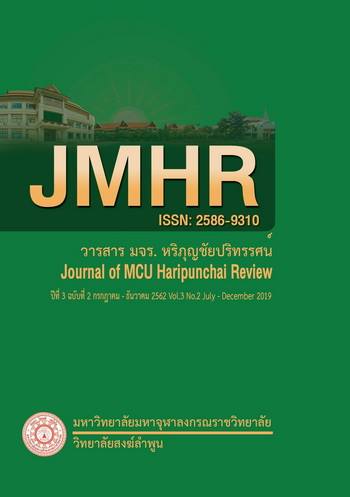Buddhist Virtues in Political Sciences
Main Article Content
Abstract
Buddhism's principles of Buddhism are an anchor in government administration for performing their duties, used as a guideline for the development of the governing body on the implementation of the Buddhist teachings of Buddhism in coexistence in society regime Buddhism, how to rule that is consistent with the basic political principles, for example Buddhism is the foundation of government, giving priority to living together in a society like happiness, moral development of parents is the starting point from of the Dhammādhipateyya (the supremacy of righteousness) is Goodness to the strengthen harmony and fellowship in society, in addition, the concept of Buddhism also helps to preserve the environment foe Five Precept and the noble eightfold path, and leading to the awakening process is Buddhist politics and a good government and a good citizen by rely on moral behavior and interaction with others, for the benefit of many people accepted and satisfied by all parties in society provide benefits to both themselves and others in living together in society and in peace.
Article Details
References
กรมการศาสนา. (2560). แนวทางการดำเนินงานชุมชนคุณธรรมและขับเคลื่อนด้วยพลัง “บวร”.กรุงเทพฯ: มหาวิทยาลัยมหาจุฬาลงกรณราชวิทยาลัย.
เกษฎา ผาทอง, และธีรภัทร์ เสรีรังสรรค์, พระพุทธศาสนากับการเมืองในสังคมไทย.(2561). วารสารวไลยอลงกรณ์ปริทัศน์ (มนุษยศาสตร์และสังคมศาสตร์) ปีที่ 8 ฉบับที่ 1 มกราคม-เมษายน 2561.
จิรโชค วีระสัยและคณะ.(2542).รัฐศาสตร์ทั่วไป.กรุงเทพมหานคร : สำนักพิมพ์มหาวิทยาลัยรามคำแหง.
ชัยวัฒน์ สถาอานันท์. (2543). อภัยวิถี: มิตร/ ศัตรู และการเมืองแห่งการให้อภัย. กรุงเทพมหานคร: คณะกรรมการดำเนินงานฉลอง 100 ปี ชาติกาล นายปรีดี พนมยงค์ รัฐบุรุษอาวุโส
ปรีชา เรื่องจันทร์. (2559). การเมือง เศรษฐกิจ สังคม Politics, Economy and Society. พิษณุโลก : สำนักพิมพ์มหาวิทยาลัยนเรศวร.
ฉัตรสุมาลย์ กบิลสิงห์และคณะ(2534).พระพุทธศาสนาเพื่อการอนุรักษ์ธรรมชาติ.กรุงเทพมหานคร : ธรรมศาสตร์.
ณฐิญาณ์ งามข า. (2552). การเมืองแห่งอภัยวิถี กับความมุ่งมาดปรารถนาที่ไกลกว่าเทววิทยาในสังคมการเมือง.รัฐศาสตร์สาร,30 (1).
พระครูภาวนาโพธิคุณ.(2554) การเมืองวิถีพุทธ. ขอนแก่นฯ : คลังนานาวิทยา.
พระธรรมปิฎก (ป.อ. ปยุตฺโต). (2554).พจนานุกรมพุทธศาสตร์ ฉบับประมวลธรรม. กรุงเทพมหานคร: พระพุทธศาสนาของธรรมสภา.
พระราชวรมุนี ประยุทธ์ ปยุตฺโต. (2526). พระพุทธศาสนากับสังคมไทย. กรุงเทพมหานคร : สำนักพิมพ์มูลนิธิโกมลคีมทอง.
สำนักงานสถิติแห่งชาติ. (2555). การสำรวจสภาวะทางสังคมและวัฒนธรรม พ.ศ. 2554.กรุงเทพมหานคร: คณะรัฐมนตรีและราชกิจจานุเบกษา.
Easton, D. (1960). The Political System. New York: Alfred A. Knoff.
Jerrold, S. (1967). The new face of Buddha: Buddhism and Political power inSoutheast Asia. London: Victor Gollancz LTD.
Leopold, A. (1970). The Land Ethics in a Sand Almanac County. New York: Ballantine Books .p 12


